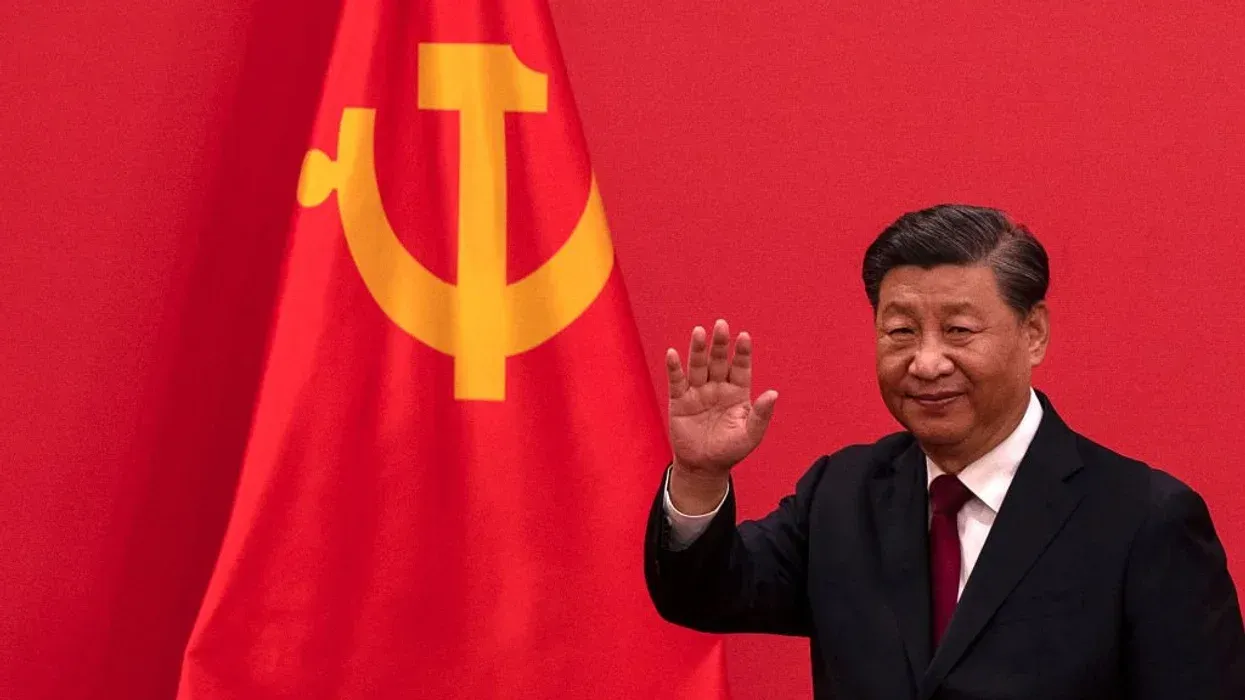
Photo by Kevin Frayer/Getty Images

There has been a great deal of chatter in recent years concerning the prospect that America could soon be eclipsed and subordinated by communist China. However, the defeatists appear to have overlooked the very real possibility that China might collapse under the weight of its ambitions before realizing them.
While there are various problems that might hamstring the communist nation and thwart its completion of Beijing's so-called hundred-year marathon, the prospect of a doomed economy is presently the most arresting.
Apparatchiks have reiterated Chinese dictator Xi Jinping's February call for patience, in which he purportedly said, "We cannot be ambitious and unrealistic, but we cannot simply follow the beaten path. ... We should be patient [with a historical perspective] and move forward in a steadfast manner," reported the South China Morning Post.
Although urging patience, Beijing has been racing to shore up its crashing currency amid broader economic woes, crashing banks, and failing corporate giants.
This week, Chinese state-owned banks hurriedly dumped U.S. dollars and bought up yuan in domestic and international foreign exchange markets in hopes of slowing the pace of the Chinese currency's depreciation, reported Reuters.
The yuan has reportedly lost roughly 2.4% against the dollar already this month and 6% overall since the start of this year, hitting a 16-year low relative to the greenback on Aug. 16.
CNBC noted that unlike the currencies in relatively free nations such as the U.S. and Japan, Beijing assigns a midpoint on any given day, such that if trade of the currency "deviates too far, according to some market watchers, the Chinese central bank will step in to buy or sell the currency, putting a lid on its daily volatility."
Accordingly, China's central bank, the People’s Bank of China, stepped up its intervention Friday, setting an onshore yuan midpoint over 1,000 basis points stronger than Reuters' 7.3065 per dollar estimate.
This move comes just days after the PBOC lowered the rate on its one-year loans by 15 basis points to 2.5% in response to anemic consumer spending growth, sliding investment, and spiking unemployment, reported Bloomberg News.
Bloomberg noted that the economic picture is particularly bleak for China, where bank loans "plunged to a 14-year low last month, while deflation is setting in and exports are contracting," adding, "One of China's largest property developers is at risk of default and a financial conglomerate with 1 trillion yuan ($138 billion) under management missed payments on investment products, stoking fears about possible contagion."
The property developer in question, Evergrande, filed for bankruptcy in New York on Thursday.
CNN Business indicated that Evergrande's default in 2021 was followed by several other major developers in China defaulting on their debts.
The Guardian reported that Country Garden, once China's largest property developer by value, is also poised to tumble. With well over $192 billion in liabilities and nearly four times as many housing projects as Evergrande in China, its collapse could also prove devastating.
The implosion of the real estate sector is especially problematic for China, given that it was long regarded as a growth engine for the economy and reportedly accounted for more than 30% of the communist nation's GDP.
"With financial troubles at developers such as Country Garden likely to weigh on the housing market in the near term, there is a real risk of the economy slipping into a recession unless policy support is ramped up soon," analysts from Capital Economics said Tuesday.
David Roche, president and global strategist at Independent Strategy, told CNBC Thursday that China's economic model "is clearly washed up on the beach with a huge number of legacy holes in it, and it's not going to take off again."
"They really don't have the approach to surgically get rid of bad debts and bad assets, and at the same time, they're not going to be able to rely on their traditional measures of growth. That's the big problem," added Roche.
U.S. Treasury Secretary Janet Yellen recently suggested that China's slowdown may in turn be a "risk factor" for the American economy.
Unemployment among Chinese youths ages 16 to 24 jumped to a record 21.3% in June, up from 20.9% the month before.
This could prove to be a destabilizing affront to the young who accepted authoritarian rule in exchange for the Chinese Communist Party's promise of progressive increases in living standards.
After months of record-high unemployment figures and facing the prospect of far more damning figures, Beijing suspended the release of monthly data.
A spokesman for China's National Bureau of Statistics attributed the suspended release to a need to improve the statistics, in part by possibly removing "students looking for jobs before graduation," reported CNN.
TheBlaze previously noted that China's present economic woes are compounded by the fallout of its brutal abortion regime.
Owing to the CCP's one-child policy implemented in 1980, as well as to other correlated factors such as a decrease in the number of women of childbearing age, declining fertility, and higher suicide rates in women than in men, China faces a demographic crisis.
Whereas in 1950, a year after the communists formally took power, China's fertility rate was 5.29, as of last summer, it hovered around 1.16.
Rana Mitter, professor of U.S.-Asia relations at the Harvard Kennedy School, has suggested that China's working-age population will drastically shrink over the next 15 years, meaning "technology will need to adapt to create new jobs for a smaller workforce, while providing enough growth to pay for pensions and health care for the rapidly growing elderly population."
While Mitter suggested there may be ways for China to improve its situation, it is nevertheless "laying traps for itself."
Like Blaze News? Bypass the censors, sign up for our newsletters, and get stories like this direct to your inbox. Sign up here!